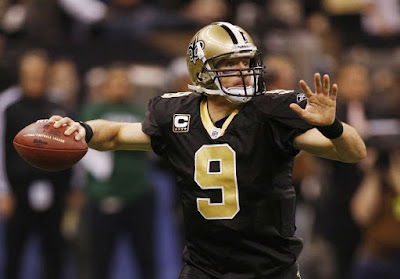Judging Drew
Brees's career will be one of the more interesting challenges 15-20 years from
now. He is a statistical marvel who teamed up with a coach and offensive wizard
who opened up the NFL. Peyton Manning led the groundwork, and Drew Brees
combined that with volume like we have never seen to put up the most voluminous
period of Quarterbacking ever. Drew Brees is unlike any QB in history. He made
a sprited run at Dan Marino's long-standing record for passing yards in a
season in 2008, falling just 14 yards short of tying Marino's mark. No matter,
he ended up smashing in three years later, compiling 5,476, and then broke the
old Marino mark two more times. If not for a missed game this season, he may
have done it a fourth time. It is hard to think of comparable players in other
sports, players that have put up absurd numbers that don't really make sense
when taken out of context.
This is clearly
the steroid era of passing statistics, though the reasons are far more above
board than they were in baseball. Well, if you want to put up a Barry Bonds, it
probably is Peyton Manning, a QB who was already brilliant before 2011 – the real
‘Year 0’ of the change – but if anything Brees is a Alex Rodriguez. Skeptics
could say he was Sammy Sosa, a player who turned great once the game was made
easier, but that is being unfair. Drew Brees has proven himself as more than a
function of a system and a league that endorsed opening up the game. He is the
one who led that fight to do just that, to challenge convention by throwing,
and throwing, and throwing.
The criticisms of Drew Brees are readily available. He is not a ‘winner’,
as while his playoff record is decent (6-5), what is more glaring is the amount
of times a team QBed by Drew Brees for a meaningful portion of the season (>
12 games) failed to make the playoffs – a startling 7 times. If anything, that
is the biggest detraction for Drew Brees, that even as passing statistics and
efficiency – which Brees is credited with holding over 600+ attempts –
correlate well with regular season success, Brees is the negative outlier. The
other criticisms are context driven, such as pinging him for playing in a dome,
or only succeeding once paired with Sean Payton; whoever almost all QBs are
generally better at home than on the road, and we have no real evidence to say
Payton is more important to the Saints passing success than Brees. The final
criticism is Brees’s penchant for throwing bad picks. When viewed against the
sheer amount of times he throws, it actually isn’t that bad, but Brees does
throw some bad ones. He’s not perfect; no one is. But he is far closer to
perfect than most.
At their peak, the Saints offense seemed wholly unstoppable. The
statistics the entire offense rolled up in 2011, a season when they set the
record for total yards (7,474), including an 8-game stretch to end the season,
including playoffs, where they rolled up 4,203 yards (525 / game). They were
the closest thing the league had seen to the Greatest Show on Turf, wholly
unstoppable unless they turned the ball over. Each performance was more
ridiculous than the next, as they scored 42-45-45-45 in four straight games.
The final one was a Wild Card win over the Lions, where they scored six
straight TDs. It was offense at a level, a robotic, peerlessly effective level,
that the league had never seen. And Brees was its mastermind.
Looking beyond his exploits as a passer, Brees the Hero of the
Common Man may be viewed differently in the future as well. Few QBs have been
extolled for their leadership and community impact as Drew, and few deserved it
so. While his story of going to New Orleans because his heart called out to him
underscores the fact that no one else really seemed to want him after his
shoulder injury, what he did in leading that team, in that city, from the first
year onwards is remarkable. The Saints were as much a part of that cities
recovery as a sports team can be, and Brees pushing that team to immediate
success was the primary driver. Yet, for all that leadership plaudits he
received, and the credit he got as being to go-to example for the potential of
a ‘short’ QB, a couple decades from now people can easily argue Russell Wilson
as the prime example of these traits.
Drew Brees is an interesting case to view historically. At best,
he is the 3rd or 4th best QB of his generation,
definitely behind Messers Manning and Brady, and arguably behind Aaron Rodgers –
or at least where Rodgers will end up. He spans a period where his late season
career and late-career dip in success for the Saints, will hurt him
historically as well as Russell Wilson running around becomes our go to for the
short type who fought against the system. Still, let’s never forget just how
impeccable Drew Brees was in his absolute prime (2006 – 2013), and how that
eight year run, and the great surrounding years as well, will always put him
right there statistically, if not so much anectodally.



